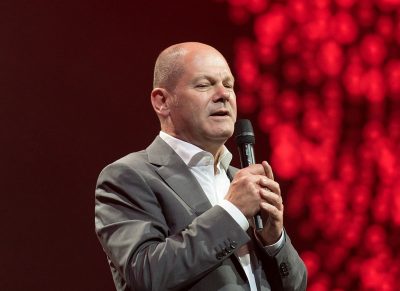Devastating Economic and Social Crisis: A Majority of Germans Want A New Government and Early Elections

All Global Research articles can be read in 51 languages by activating the Translate Website button below the author’s name (only available in desktop version).
To receive Global Research’s Daily Newsletter (selected articles), click here.
Click the share button above to email/forward this article to your friends and colleagues. Follow us on Instagram and Twitter and subscribe to our Telegram Channel. Feel free to repost and share widely Global Research articles.
***
More than half of German voters are so dissatisfied with Chancellor Olaf Scholz’s coalition government that they want early elections. The decline of Scholz’s coalition government also comes as German Defence Minister Boris Pistorius said that it would take Europe between five and eight years to recover its defensive capacity after disarming itself by sending weapons to Ukraine.
According to a survey by the German newspaper Bild and published by Bloomberg on December 16, 59% of Germans would prefer elections for a new parliament in 2024, while 27% oppose such a measure. Regular elections are scheduled for the fall of 2025.
The German government’s Advisory Council of Economists, known as the Five Sages, said,
“Germany’s current economic development continues to be affected by the energy crisis and the drop in real incomes.”
“That’s why our annual report this year is titled ‘Overcoming weak growth, investing in the future’,” said Monika Schnitzer, president of the Five Sages, when handing the document to German Chancellor Olaf Scholz in November.
Berlin is currently the worst-performing large developed economy in the world, and the IMF and the European Union predict the German economy will contract this year. According to Euronews, the recession arose from the loss of cheap Russian natural gas because of the sanctions imposed by the European bloc. Due to this, industries felt an unprecedented shock.
It is recalled that Christian Kullmann, CEO of major German chemical company Evonik Industries AG, said in October that Germany risks “de-industrialisation” as high energy costs and government inaction on other chronic problems threaten to send new factories and high-paying jobs abroad.
The loss of cheap Russian natural gas needed to power factories “painfully damaged the business model of the German economy,” Kullmann said.
Olaf Scholz, a Social Democrat; the Minister of Economy, Robert Habeck of the Greens; and the head of finance, Christian Lindner, leader of the Free Democrats, have not had an effective working relationship, raising questions about the viability of the three-party alliance formed after the 2021 elections.
Scholz’s governing coalition recently suffered crushing electoral defeats. In a context of growing voter frustration, the three government parties lost support in Bavaria and Hesse, where around a fifth of the German electorate resides.
At the same time, a candidate from the Russia-friendly Alternative for Germany (AfD) party won a city mayoral election for the first time on December 17. Tim Lochner won the second round of voting in Pirna, a town in the eastern state of Saxony, despite the state’s domestic intelligence agency attempting to deter voters from AfD by deeming the party to be right-wing extremists.
This again highlights the growing backlash against the ruling coalition, which not only significantly weakened Germany’s economy by imposing sanctions on Russia but weakened the collective strength of Europe’s defensive capabilities by sending weapons to Ukraine for a futile war effort.
According to German Defence Minister Boris Pistorius, it will take Europe five to eight years to restore its defence capabilities because it must compensate Ukraine for the aid it lacks from the US.
“The defence industry will take time to get going. Right now, we have between five and eight years left to catch up in the military, industrial and social spheres,” Pistorius declared to the German newspaper Welt on December 16.
Pistorius added that in the next ten years, the United States will show more interest in the Pacific region than in Europe, so the Europeans themselves must become more involved in guaranteeing security in the region. To the question of whether Europe is preparing for the “worst case scenario,” in which Europeans compensate Ukraine for the aid it stopped receiving from the US, the minister said that the EU is discussing the issue. The fact that the discussions are still ongoing despite Europe demilitarising and ruining its own economy for a failed war effort against Russia shows that there are still large corners within the bloc in denial about the current situation.
The EU has been trying to reach a deal on €20 billion in military aid to Ukraine and aims to include another €50 billion in the EU budget to provide macro-financial assistance to Kiev over the next four years. However, the plans have met opposition from some Member States, notably Hungary.
Germany, under Scholz, has been a leading campaigner in Europe to impose sanctions on Russia and facilitate weapon movements to Ukraine. His predecessor, Angela Merkel, for 16 years helped Germany prosper through cordial trade relations with Russia, but only two years of Scholz has resulted in hostile ties with Moscow, an economy performing worse than sanctioned Russia, and political instability.
*
Note to readers: Please click the share button above. Follow us on Instagram and Twitter and subscribe to our Telegram Channel. Feel free to repost and share widely Global Research articles.
Ahmed Adel is a Cairo-based geopolitics and political economy researcher. He is a regular contributor to Global Research.
Featured image is licensed under CC BY-SA 4.0

